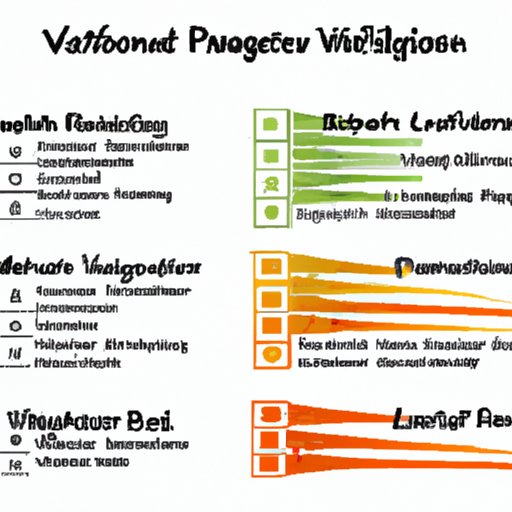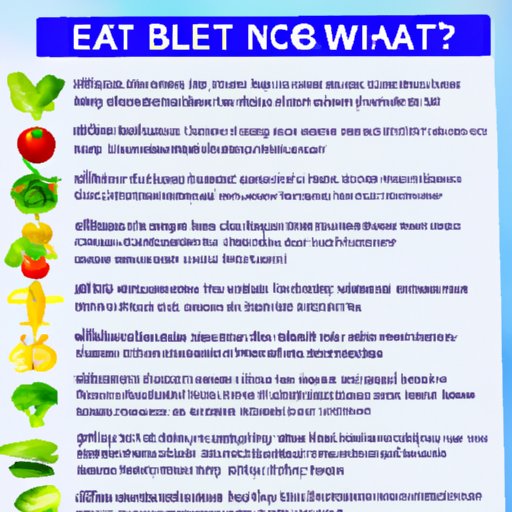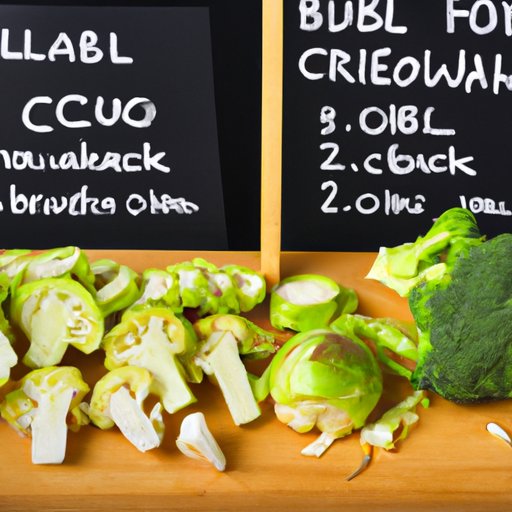Introduction
Weight loss is a common goal for many people, and it can be achieved through healthy lifestyle habits such as regular physical activity, reducing stress, and making dietary changes. Eating more vegetables is an important part of any successful weight loss plan, as they are low in calories and packed with essential vitamins and minerals. In this article, we will explore the best vegetables to eat for weight loss and how to incorporate them into your diet.

A Comparison of the Nutritional Benefits of Different Vegetables for Weight Loss
When it comes to weight loss, not all vegetables are created equal. It’s important to understand the nutritional differences between different types of vegetables in order to make informed choices about which ones to include in your diet. Let’s look at the macronutrients, micronutrients, and calorie content of some of the most popular vegetables.
Macronutrients
Macronutrients are the nutrients that provide the body with energy. The three macronutrients are carbohydrates, proteins, and fats. Vegetables are generally low in fat, but some have higher amounts than others. They also vary in their carbohydrate and protein content. For example, potatoes are higher in carbohydrates than other vegetables, while peas are higher in protein.
Micronutrients
Micronutrients are the vitamins and minerals that are essential for good health. All vegetables contain a variety of micronutrients, but some are richer sources than others. For example, dark leafy greens such as spinach and kale are excellent sources of vitamins A, C, and K, as well as iron, calcium, and magnesium.
Calories
For weight loss, it’s important to focus on low-calorie foods. Most vegetables are very low in calories, but some are higher than others. For example, carrots and sweet potatoes are higher in calories than other vegetables, while celery and cucumbers are among the lowest-calorie options.

A Guide to Eating Vegetables to Support Sustainable Weight Loss
In order to successfully lose weight, you need to make sure that you are getting enough nutrients while still keeping your calorie intake in check. To do this, aim to include a variety of vegetables in your diet. Here are some tips for doing so:
Variety
Aim to include a variety of different vegetables in your diet. This will ensure that you get a wide range of vitamins and minerals, as well as help prevent boredom with your meals. Try to include both raw and cooked vegetables in your meals, as each has its own unique nutrient profile.
Timing
When it comes to weight loss, timing is important. Aim to include vegetables in every meal and snack. This will help keep you feeling full and satisfied, and will prevent overeating later in the day. Additionally, try to eat vegetables first when you sit down for a meal, as this will help you fill up on the lower-calorie options.
Portions
Portion control is key when it comes to weight loss. Aim to fill half of your plate with vegetables, and the other half with lean proteins and complex carbohydrates. This will help ensure that you get all the nutrients you need, while still controlling your calorie intake.
An Overview of the Top 10 Low-Calorie Vegetables for Weight Loss
Now that we know what to look for in terms of nutrition, let’s take a look at the top 10 low-calorie vegetables for weight loss. Here is a brief overview of each:
Celery
Celery is an excellent source of fiber and contains only 16 calories per cup. It is also high in vitamins A, K, and C, as well as potassium and folate.
Broccoli
Broccoli is a cruciferous vegetable that is high in fiber and low in calories. One cup of cooked broccoli contains 31 calories, as well as vitamin C, vitamin K, and folate.
Spinach
Spinach is a leafy green that is high in vitamins A, C, and K, as well as iron and calcium. One cup of cooked spinach contains only 41 calories.
Kale
Kale is another leafy green that is high in vitamins A, K, and C, as well as iron and calcium. One cup of cooked kale contains 36 calories.
Cucumber
Cucumbers are a hydrating and cooling vegetable that is low in calories and high in fiber. One cup of sliced cucumber contains only 16 calories.
Tomato
Tomatoes are a versatile vegetable that is high in vitamins A and C, as well as lycopene. One cup of chopped tomatoes contains only 32 calories.
Carrots
Carrots are a sweet and crunchy vegetable that is high in fiber and beta carotene. One cup of chopped carrots contains 52 calories.
Bell Pepper
Bell peppers are a colorful and flavorful vegetable that is high in vitamins A and C, as well as fiber. One cup of chopped bell pepper contains only 24 calories.
Mushrooms
Mushrooms are a savory and earthy vegetable that is low in calories and high in antioxidants. One cup of chopped mushrooms contains only 15 calories.
Asparagus
Asparagus is a nutrient-dense vegetable that is high in vitamins A, C, and K, as well as folate. One cup of cooked asparagus contains only 27 calories.

The Role of Cruciferous Vegetables in Weight Loss
Cruciferous vegetables, such as broccoli, cauliflower, and Brussels sprouts, are particularly beneficial for weight loss. They are high in fiber and low in calories, and they have a number of other health benefits as well. Let’s take a closer look at the role of cruciferous vegetables in weight loss:
Nutrient Profile
Cruciferous vegetables are a great source of vitamins, minerals, and phytochemicals, which are plant compounds that have antioxidant and anti-inflammatory properties. They also contain glucosinolates, which are sulfur-containing compounds that may help reduce inflammation and protect against cancer.
Digestive Health
The fiber in cruciferous vegetables helps promote digestive health by keeping the bowels regular and preventing constipation. This is important for weight loss, as it helps to ensure that the body is able to effectively absorb and utilize the nutrients from food.
Metabolic Boost
The fiber in cruciferous vegetables helps to slow digestion, which can help to keep you feeling fuller for longer and prevent overeating. Additionally, some research suggests that cruciferous vegetables may help to boost metabolism, which can help increase the rate at which the body burns calories.
How to Incorporate Vegetables into Your Diet to Promote Weight Loss
Incorporating vegetables into your diet is key for successful weight loss. Here are some tips for doing so:
Meal Planning
Meal planning is an important part of any weight loss plan. Make sure to include a variety of vegetables in your meals, such as leafy greens, cruciferous vegetables, and low-calorie options such as celery and cucumber. Additionally, try to include vegetables in snacks throughout the day to help keep you full and energized.
Preparing Vegetables
There are many ways to prepare vegetables to make them more enjoyable. Try roasting, grilling, steaming, or sautéing them with herbs and spices. You can also add them to soups, stews, casseroles, omelets, and stir-fries. Experiment with different cooking methods and recipes to find ones that you enjoy.
Creative Recipes
Get creative with your recipes and try to come up with new ways to incorporate vegetables into your meals. For example, try adding finely chopped vegetables to meatloaf or stuffing them into tacos. You can also make smoothies with frozen fruits and vegetables, or add pureed vegetables to sauces and dressings.
Exploring the Health Benefits of Eating Vegetables for Weight Loss
Eating vegetables is an important part of any weight loss plan, but it also has many other health benefits. Here are just a few:
Cardiovascular Health
Eating a diet rich in vegetables can help improve cardiovascular health. Vegetables are high in fiber, which helps to lower cholesterol levels and reduce the risk of heart disease. They are also high in antioxidants, which help protect the cells in the body from damage.
Immune System Support
Vegetables are high in vitamins and minerals, which help to support a strong immune system. Vitamins A and C, in particular, are important for immunity and can help to protect the body from infections and illnesses.
Gut Health
The fiber in vegetables helps to promote digestive health and regularity. It also helps to feed the beneficial bacteria in the gut, which are important for overall health and wellness.
Conclusion
Eating more vegetables is an important part of any successful weight loss plan. Vegetables are low in calories and high in essential vitamins, minerals, and fiber. There are many varieties of vegetables to choose from, including leafy greens, cruciferous vegetables, and low-calorie options such as celery and cucumber. Incorporating these vegetables into your diet can help you achieve your weight loss goals, as well as provide numerous other health benefits.
Summary of Main Points
In summary, eating more vegetables is an important part of any successful weight loss plan. Aim to include a variety of vegetables in your meals and snacks, and focus on low-calorie options such as celery, broccoli, spinach, and kale. Cruciferous vegetables, such as broccoli and cauliflower, are particularly beneficial for weight loss, and they also provide numerous other health benefits. Finally, make sure to incorporate vegetables in creative ways to make them more enjoyable.
Final Remarks
Eating more vegetables is an important part of any successful weight loss plan. Not only are they low in calories and high in essential vitamins and minerals, but they also provide numerous other health benefits. By incorporating a variety of vegetables into your diet, you can reap the rewards of a healthier and happier lifestyle.
(Note: Is this article not meeting your expectations? Do you have knowledge or insights to share? Unlock new opportunities and expand your reach by joining our authors team. Click Registration to join us and share your expertise with our readers.)
